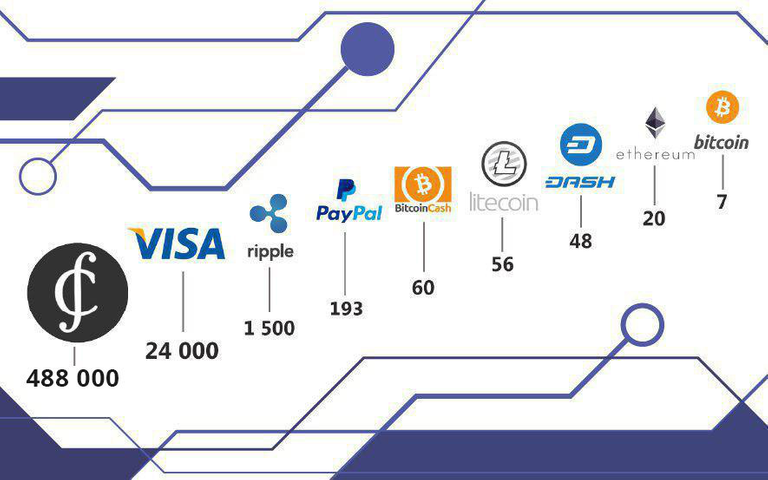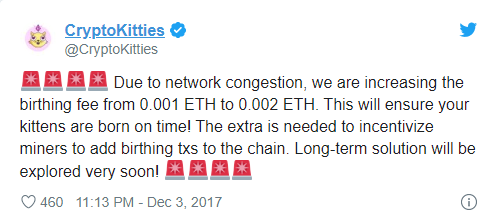We currently have around 5,000 different cryptocurrencies running on almost 900 different blockchains, according to data provided by CoinMarketCap. Blockchains can be divided into 3 main groups: public, private, and hybrid blockchains.
Credits is a public blockchain. It is an open-source, fully decentralized blockchain platform that supports smart contracts that can be programmed to create high-performance applications.
There are many use cases of the Credits platform. It can be used for micro-transactions, but also mass financial payments, issuing of tokens and stable-coins, and data storage on the blockchain.
In this article, I am going to focus on the 3 main reasons why I believe that Credits blockchain has a very bright future.
1. Transaction Volume
Bitcoin, the oldest and most popular cryptocurrency in the world suffers from scalability problems. The Bitcoin blockchain can handle between 3-7 transactions per second.
Ethereum, a more scalable solution compared to Bitcoin can handle 300 transactions per second. The developers of Ethereum are working on upgrades that will make it possible for the Ethereum blockchain to handle up to 3,000 transactions per second. Crypto enthusiasts are waiting patiently on those results.
Let us now take a look at what some other popular blockchains achieve when it comes to the transaction volume.
Litecoin, the baby brother of Bitcoin, does much better than Bitcoin in this field. But Litecoin can still handle a maximum of only 50-60 transactions every second.
A recently published article claims that EOS has achieved around 4,000 transactions at its maximum peak but the current EOS network is only handling around 600 transactions every second.
How Many Transactions Per Second Can the Credits Blockchain Reach?
According to data available on the official website, Credits is capable of handling more than 1,000,000 transactions per second! We all know that theory is one thing but what happens when the Credits Blockchain is put to the test?
Credits technicians did exactly that. They created a testing environment that simulates the sending of transactions to the network. The goal of this test was to check what the maximum load of the network is and is it capable of processing huge volumes of transactions.
The results were astonishing! At peak load, the Credits blockchain was able to process 488,403 transactions per second! The test was run 30 times and the results show 300,000 - 500,000 transactions per second every time. The developers believe that the infrastructure is capable of accommodating over 500,000 transactions per second but the main problem was to create a proper testing environment where such goals could be recorded. This time, they were not able to do that.
These numbers are extraordinary but limitations in hardware, and its configuration, prevented even better results. The developers acknowledge that low-quality equipment was used in the testing and due to the physical limitations of said hardware the supposed transaction volumes could not be reached.
If the development team of Credits manages to optimize the programming code it is believed that soon, we can easily see results as high as 1 million transactions per second. The developers are even talking about future scalability of up to 10 million transactions per second. One thing is for sure and that is that the Credits blockchain is currently one of the fastest, if not the fastest blockchain in the crypto industry.
2. Transaction Execution Speed
The transaction execution speed is the time it takes for a transaction to go from Point A to Point B. Of course, different cryptocurrencies have different execution speeds and this depends on a few things:
The congestion of the network
Volume of transactions
Transaction fees
Let us now consider how long it takes to send money using the most popular cryptocurrencies today.
Bitcoin produces new blocks on average every 10 minutes. Therefore, those 10 minutes is the average for a Bitcoin transaction to be confirmed.
The processing time for Ethereum depends on the used gas. It is hard to give precise estimates, but it typically takes 15-30 seconds and sometimes up to 5 minutes, depending on the state of the network.
Ripple and EOS are 2 coins that are on top of the list when it comes to confirmation times. Ripple states that their transactions are confirmed within 4 seconds. EOS is capable of executing their transactions in 1.5 seconds.
What Happened During the 2017 Bull Run?
The bull run in 2017 is a good example of the scalability issues that Bitcoin and Ethereum blockchains faced in times of huge transaction volumes. At the end of 2017, almost 200,000 Bitcoin transactions were stuck in the mempool waiting for confirmation. Some users have reported waiting up to 3 days to receive their Bitcoins.
Ethereum faced network congestion at the end of 2017 as well. CryptoKitties, an Ethereum-based game caused network-wide delays on Ethereum. It was reported that the game caused an increase in pending transactions by 600%. And again, users reported waiting for hours and in some instances for days to receive their funds.
Transaction Execution Speed of Credits
With an optimal internet connection, Credits transactions can be executed as fast as 0.01 seconds! The platform uses its native protocols - CDCA (Credits Decision Consensus Algorithm), and CDTP (Credits Data Transmission Protocol) to increase the speed of processing transactions. The source code is optimized in such a way to facilitate fast processing speeds through direct device processor operations. The speed is raised
by optimizing the underlying computing algorithm, memory access, redistribution of data, and spreadsheet calculations of functions.
This is explained in more details here: https://medium.com/@credits/why-is-credits-faster-than-other-blockchains-1555a5f3e995
3. Transaction Cost
It is in human nature to want to save money. Cryptocurrencies with low transaction fees are desirable when there is a need to move funds.
The cost of a Bitcoin transaction depends on the amount of Satoshis the sender is prepared to pay per byte of data sent. If we are going to convert these numbers to USD values, we are looking at minimum fees of $0.10-0.25 per transaction. But this is the cost during low to normal market movements. When Bitcoin experiences an upward trajectory, the standard fees can easily reach the $5-10 areas.
During the bull run in December 2017, recommended transaction fees went as high as $50-60 for Bitcoin transactions, making the $5-10 fees seem cheap.
Ethereum transactions are cheaper compared to Bitcoin. On average, a standard Ethereum transaction costs between $0.10 - 0.30. The fees can even reach the $1 zone.
I mentioned earlier the CryptoKitties game that caused havoc on the Ethereum network in December 2017. Due to the popularity of the game, the game developers were forced to double the in-game fees to incentivize miners to include those transactions in the upcoming blocks as soon as possible. Other sources have reported that the fees for Ethereum transactions were as high as $4 in those months.
The EOS network is a bit different. There are no transaction fees when sending EOS tokens but during the creation of EOS accounts a user needs to purchase CPU, bandwidth, and RAM. This is achieved by staking EOS tokens. For a platform that markets itself as having no transaction fees the costs for creating new accounts rose to nearly $4 in 2018.
How Much Does It Cost to Send a Transaction on the Credits Blockchain?
The cost varies between $0.01 and $0.00001 per transaction.
The Credits Whitepaper explains that the cost of a transaction will depend on the network load but also on individual users and the number of transactions they broadcast at certain peak times. In the first 3 years of the Credits system, the cost of transactions will be set individually depending on the type of transaction.
The Credits network is a lightning-fast blockchain platform with an advanced level of security. It is based on the Byzantine Fault Tolerance algorithm and has a wide range of use cases. It is a market leader in terms of speed and transaction costs. Thanks to its smart contracts it is possible to create and run decentralized applications and services. IT giants such as Lenovo and IBM are already using the Credits blockchain in their businesses.
Credits has a total supply of around 250 Million tokens with 185 Million already in circulation. Compared to other coins of similar supply it is undervalued at the moment but that can quickly change. If the developers succeed in optimizing the code to facilitate 1 Million transactions per second, we are looking at a token whose value will be much higher than the current price of $0.07.
For more information about Credits please visit:
Website: https://credits.com/
Announcement thread: https://bitcointalk.org/index.php?topic=3375263
Facebook: https://www.facebook.com/creditscom/
Twitter: https://twitter.com/creditscom
Telegram: https://t.me/creditscom
GitHub: https://github.com/CREDITSCOM
Sources:
https://irishtechnews.ie/credits-reaching-speeds-of-488403-transactions-per-second-during-tests/
https://hackernoon.com/who-scales-it-best-blockchains-tps-analysis-pv39g25mg
https://qz.com/1145833/cryptokitties-is-causing-ethereum-network-congestion/




Hello,
Your post has been manually curated by a @stem.curate curator, @alby2 .
We are dedicated to supporting great content, like yours on the STEMGeeks tribe.
If you like what we are doing, please show your support as well by following our Steem Auto curation trail.
Please join us on discord.
Wow! This is interesting indeed.
Now imagine what these transactions can do for the poor in this world.
If only 0.0001 of every transaction can monthly be sent to charities in every country it will relieve our problems to scrounge for funds to continue operating.
Blessings!
Blockchain really creates opportunities that were not available before and we are still at the beginning.
Well. let's hope that some mastermind out there will include charities in their plans my friend.
Blessings!
Congratulations @bernardos! You have completed the following achievement on the Steem blockchain and have been rewarded with new badge(s) :
You can view your badges on your Steem Board and compare to others on the Steem Ranking
If you no longer want to receive notifications, reply to this comment with the word
STOPVote for @Steemitboard as a witness to get one more award and increased upvotes!